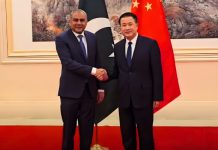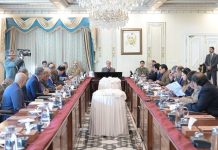-Asks Ministers to address challenges by prioritizing issues
-Says no more excuses only quality performances is required
-Expresses satisfaction over economic turnaround
-Hails current account surplus for fifth consecutive month
By Ajmal Khan Yousafzai
ISLAMABAD: Prime Minister Imran Khan on Tuesday asked the federal ministries to deliver their best and address the challenges facing the country by prioritizing and channelizing the issues.
According to the Prime Minister’s Office, federal ministers of various ministries signed performance agreements with the prime minister. “We will put pressure on ourselves to take our governance performance to much higher levels in our remaining two-and-a-quarter years,” the premier said.
“We no longer have an excuse that we’re new and are learning because most of us came into power for the first time. The time for performance has arrived,” he added.
Terming the signing of performance agreements “a step in the right direction”, Prime Minister Imran said the performance of each ministry will be evaluated based on the contracts and every ministry will put pressure on itself to meet its targets.
“After all, the public has to decide after five years whether we made their lives better or not; whether we fulfilled the promises made to them or not,” he said, stressing that governance could not be delivered unless all ministries performed individually.
Among the government targets, the premier said he saw the power ministry as the biggest challenge for the country and his government, which he said sometimes “keeps me awake at night”.
“The power sector is such a complex and complicated sector; there are so many different things that need to be rationalised and synchronised to provide people with affordable power and not add to the rising circular debt,” he said.
He said although some factors concerning the power sector were in the government’s control, others were not. The premier named subsidies worth Rs2,500 billion as the second biggest challenge for his administration, noting that all countries provided subsidies to benefit the poor and to uplift their backward areas.
Mentioning wealth creation as the third test for the government, he said if exports were not increased, the issue of current account deficit would remain. The prime minister took this moment to praise the latest data which showed on Tuesday that Pakistan’s current account recorded a surplus for the fifth consecutive month in November, terming it a matter of “pride” for the government.
He emphasised the need to use subsidies for wealth creation, but said some subsidies needed to be targeted to benefit a select few, and not the rich and poor alike.
Prime Minister Imran said another “mountain” of burden on the government was of pensions, saying they were increasing in all government departments and nobody really planned for them. He told his adviser Dr Ishrat Husain, who was seated in the audience, that his pension scheme was awaited that could help make pensions less of a liability.
He said the government also needed to concentrate on agriculture, acknowledging that this area did not get enough focus. He noted that increasing productivity was important for improving food security and giving employment, saying the country could benefit greatly from cooperation with China for agriculture under CPEC.
“I have realised that until the system of our bureaucracy doesn’t speed up, we will need to start dividing things into channels according to priority, which we will keep online. All grade A projects will be followed and there will be no obstacles in them. […] So we will make channels so that top priority issues are fast-tracked, and if they stop we will penalise ministries,” Prime Minister Imran said.
Returning to the export sector, he said the government will prioritise “everything that either brings in dollars or saves dollars in the country because as our economy grows, we fear that it will start putting pressure on our current account”.
“There is no excuse for the government for any lack of experience. It is the time to deliver,” the Prime Minister said, as he inked a ‘Performance Agreement of Ministries for the Year 2020-21’ with his cabinet members.
The Performance Agreement is aimed at pacing up the working of federal ministries for an overall improved governance.
The Prime Minister warned that the persons found responsible for red-tapism in ministries, particularly in case of projects beneficial for the country, would be penalized.
The federal ministers, sitting side by side with the Prime Minister, separately signed the agreement, pledging to meet the set targets while implementing the government’s agenda of economic prosperity.
The Prime Minister counted power generation, subsidies, inflation, exports, food security, pension system and agriculture as the “major challenges” requiring action on urgent basis.“We will prioritize every sector or area having the potential to generate revenue,” he said.
Terming the power sector as “most complicated and complex challenge”, he said, efforts were needed for its rationalization and synchronization to address the problem of circular debt.
On subsidies, Imran Khan said managing the huge financial burden of Rs 2,500 billion was a real challenge.
He endorsed the subsidies for the purpose of wealth creation or benefit of the under-privileged, however opposed an across-the-board facility even for affluent. The Prime Minister said the hefty amount of pensions in lieu of federal and provincial public departments was another “liability” that required an effective and affordable system.
He mentioned the pension scheme proposed by Dr Ishrat Hussain under Civil Service Reforms which was based on the Malaysia’s Dr Mahathir formula of ‘pensions converted into savings’.He said including the subjects of food security and environment in provincial list under the 18th Amendment made it difficult to meet the goals due to lack of coordination among Centre and provinces.
Imran Khan said in case a province did not release wheat stock, it put an undue blame on the Centre for an overall price inflation of the commodity.
The Prime Minister said increase in agricultural productivity was vital and mentioned that Pakistan was adopting techniques from China under transfer of agri-technology linked with the Economic Corridor.
He said economy made a remarkable turnaround in two years with current account witnessed in surplus for last consecutive five months.
“To ensure continuity of positive economic indicators, it is important to identify the pitfalls in advance,” he said.
The Prime Minister lauded his Special Assistant on Establishment Mohammed Shehzad Arbab for the initiative of Performance Agreement of ministries, which will ensure good governance.
Moreover, Prime Minister Imran Khan on Tuesday said Pakistan’s economy was making a “remarkable turnaround’ as November had a current account surplus of $447 million.
“MashaAllah, despite COVID-19, great news on economy – remarkable turnaround,” the Prime Minister said in a tweet.
Imran Khan said for fiscal year so far, the surplus was $1.6 billion as opposed to deficit of $1.7 billion during same period last year.
He said State Bank of Pakistan’s reserves had risen to about $13 billion, which was highest in three years.
Also, Prime Minister Imran Khan tweeted on Tuesday that the country posted a current account surplus of $447 million in November. “MashaAllah despite Covid 19 great news on economy – remarkable turnaround. Current account surplus again in Nov: $447 mn,” the prime minister said.
“For fiscal year so far, surplus is $1.6 billion as opposed to deficit of $1.7bn same period last year.”
Prime Minister Khan noted that the State Bank of Pakistan’s (SBP) foreign exchange reserves have risen to about $13 billion, the highest in three years.
The country’s current account had remained in surplus for the fourth month in a row at $382 million in October 2020 as compared to $59 million in September. Minister for Planning and Development Asad Umar had last month tweeted: “This is the 4th month of current account surplus.” He said the current account surplus was recorded at $1.2 billion during the July-October period.




